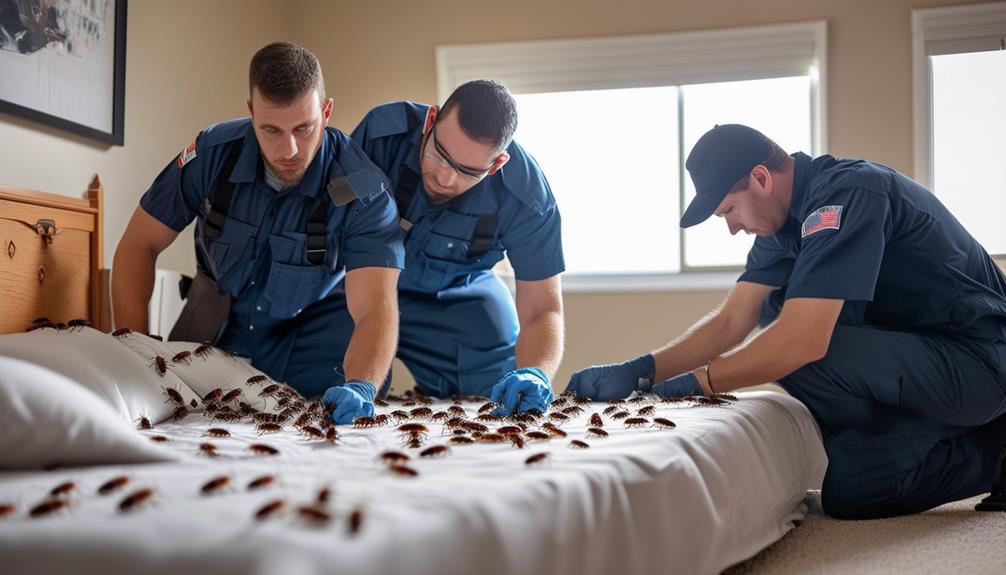So, you’re lounging on your couch, enjoying a peaceful evening in your rented property, when suddenly you spot a line of tiny, determined ants making their way across your kitchen counter.
Ah, the joys of cohabiting with nature’s tiny invaders! But who bears the responsibility for dealing with these industrious intruders? Is it your job as the tenant, or should your landlord come to the rescue?
Well, my friend, buckle up and prepare to discover the fascinating world of ants in rental properties, where tenants and landlords dance around the question of who holds the ant-fighting baton. Trust me, this discussion may just save you from losing your sanity in the face of these persistent pests.
Key Takeaways
- Tenants must promptly notify landlords of any pest issues and open communication is crucial for effective pest control in rental properties.
- Tenants may be responsible for the cost of pest control if they caused the infestation, but landlords have a legal obligation to address pest infestations and ensure habitable living conditions.
- When dealing with an ant infestation, tenants should take pictures to document the extent of the infestation, notify landlords immediately, cooperate with the landlord’s investigation, and follow their instructions regarding pest control measures.
- Hiring professionals for regular inspections, property sealing, and pest prevention and treatment can help maintain a healthy living environment, reduce the risk of legal action, and address pest-prone areas effectively.
Pest Control Responsibilities for Tenants
As a tenant, you’re responsible for promptly notifying your landlord of any pest issues that arise in your rental property. It’s important to understand your role in pest control to ensure a safe and habitable living environment.
Landlords have a legal obligation to address pest infestations, but tenants must take the first step by reporting any signs of pests. Once notified, landlords are responsible for taking necessary measures to control the infestation.
Depending on your lease agreement, you may be responsible for the cost of pest control if you’re found to be the cause of the infestation. It’s crucial to communicate openly with your landlord and follow any instructions provided to effectively address the specific type of pest infestation.
Legal Obligations for Landlords
Landlords bear the legal responsibility of ensuring that their rental properties remain pest-free and habitable. When it comes to pest control in rental properties, landlords are responsible for taking prompt action to address any pest issues that arise. Failure to do so can lead to legal consequences. To understand the scope of the landlord’s obligations, it’s important to consider common pests that can infest rental properties. The table below highlights some examples:
| Common Pests | Signs of Infestation | Landlord’s Responsibility |
|---|---|---|
| Ants | Trails of ants | Hiring professional pest control services to eliminate the infestation |
| Cockroaches | Foul odor, droppings | Arranging regular pest control treatments and sealing entry points |
| Bed bugs | Itchy bites, bloodstains on sheets | Scheduling professional extermination and notifying neighboring units |
Landlords must also include provisions in lease agreements that outline the responsibilities of tenants in preventing and reporting pest issues. This ensures a collaborative effort in maintaining a pest-free environment for all residents.
Steps to Take When Dealing With Ant Infestation
If you discover an ant infestation in your rental property, there are several steps you should take to effectively address the issue:
-
Take pictures of various areas where ants are present: It’s important to document the extent of the infestation visually. By taking pictures, you can provide evidence to support your claims and help determine who’s responsible for the infestation.
-
Notify your landlord or property management immediately: Inform your landlord about the ant infestation as soon as possible. This allows them to take action promptly and arrange for pest control services if necessary.
-
Cooperate with the landlord’s investigation: If the landlord can prove that the infestation was caused by tenant negligence, you may be held responsible for the cost of pest control. By cooperating with the investigation, you can demonstrate your willingness to resolve the issue and avoid any potential conflicts.
-
Follow the landlord’s instructions: Once the responsibility has been determined, follow the landlord’s instructions regarding pest control measures. If it’s your responsibility to pay for pest control, make arrangements to have it done promptly to prevent further damage and ensure the problem is resolved.
Tenant Rights in Pest Control
Tenants have certain rights when it comes to pest control in rental properties. As a tenant, it’s important to be aware of these rights and understand the responsibilities of both you and your landlord.
In the case of pest infestations, the landlord has the ultimate responsibility to ensure a habitable living environment, as mandated by the warranty of habitability. If you discover pests in your rental property, it’s crucial to notify your landlord immediately in writing. They’re then legally obligated to take prompt action and hire professional pest control services to eliminate the infestation.
However, it’s worth noting that in some cases, lease agreements may include provisions that hold tenants responsible for the cost of pest control if they’re found to be the cause of the infestation. Therefore, it’s advisable to seek legal advice to fully understand your rights and responsibilities as a tenant in pest control matters.
This information is particularly relevant in New York, where pest infestations can be difficult to eliminate.
Hiring Professionals for Pest Prevention and Treatment
When it comes to ensuring a pest-free rental property, one effective approach is to hire professionals for seasonal preventative pest control. By seeking out a reputable pest prevention and treatment provider, you can ensure that effective and safe pest control measures are implemented in your rental property.
Here are four reasons why hiring professionals for pest prevention and treatment is crucial:
-
Regular inspections: Professionals can conduct thorough inspections of your property, identifying any signs of pest infestations. This helps in early detection and prevention of pests before they cause significant damage.
-
Property sealing: Pest control professionals can work with you to seal up your property, preventing pests from entering. They’ll identify and address potential entry points, such as cracks and gaps, ensuring that your rental property remains pest-free.
-
Expertise in pest-prone areas: These specialists have the expertise to identify and address pest-prone areas within your rental property. They can provide valuable recommendations on how to eliminate conditions that attract pests, reducing the risk of infestation.
-
Avoid legal action: By taking proactive measures and hiring professionals for pest prevention and treatment, you can fulfill your responsibilities as a landlord and avoid potential legal action from tenants who may suffer from pest-related issues.
It’s crucial to prioritize pest control to maintain a healthy and comfortable living environment for your tenants.
Frequently Asked Questions
Is an Ant Infestation the Landlords Responsibility?
An ant infestation is typically the landlord’s responsibility, but tenants have obligations too. It’s important to prevent pests by maintaining cleanliness and notifying your landlord promptly. Shared responsibility, legal implications, and health concerns make pest control a crucial aspect of property maintenance.
Who Calls Pest Control in a Rental Property?
You, as a tenant, are responsible for notifying your landlord of any pest issues in the rental property. The landlord should then call for professional pest control, and the costs may be covered by either the landlord or the tenant, as outlined in the lease agreement.
Are Landlords Responsible for Pest Control in NY State?
Landlords in NY are legally obligated to ensure pest prevention and inspection in rental properties. However, tenants also have obligations to report pest issues. Landlords must provide pest control services to maintain health and safety standards.
Are Landlords Responsible for Pest Control in Pa?
As a tenant in Pennsylvania, it is important to understand your obligations for pest prevention. The landlord has a duty to provide a pest-free property, but legal implications and shared responsibilities may affect the landlord’s liability. Contractual agreements and tenant notification are crucial, and professional extermination expenses may be shared.




